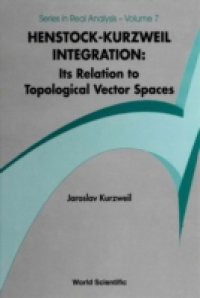Henstock-Kurzweil (HK) integration, which is based on integral sums, can be obtained by an inconspicuous change in the definition of Riemann integration. It is an extension of Lebesgue integration and there exists an HK-integrable function f such that its absolute value f is not HK-integrable. In this book HK integration is treated only on compact one-dimensional intervals.The set of convergent sequences of HK-integrable functions is singled out by an elementary convergence theorem. The concept of convergent sequences is transferred to the set P of primitives of HK-integrable functions; these convergent sequences of functions from P are called E-convergent. The main results: there exists a topology U on P such that (1) (P,U) is a topological vector space, (2) (P,U) is complete, and (3) every E-convergent sequence is convergent in (P,U). On the other hand, there is no topology U fulfilling (2), (3) and (P,U) being a locally convex space.Key Features:Reviews the main philosophical theories of probability in a form accessible to scientists and the general audienceAnalyzes in detail all aspects of foundations of probability — philosophical theories, scientific applications, decision theory and mathematical foundationsRevives and brings to the mainstream an important philosophical theory of probability proposed by Karl PopperWritten from the viewpoint of a scientist, making philosophy of probability accessible to people who are not professional philosophersContains a review of popular philosophical positions taken by authors of scientific textbooks and Wikipedia

